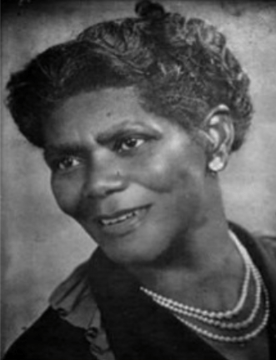Laudelina de Campos Melo facts for kids
Quick facts for kids
Laudelina de Campos Melo
|
|
|---|---|
 |
|
| Born | 12 October 1904 Poços de Caldas, Minas Gerais, Brazil
|
| Died | 12 May 1991 (aged 86) |
| Nationality | Brazilian |
| Other names | Laudelina Campos de Mello, Laudelina Campos Mello, Nina Campos de Mello |
| Occupation | domestic worker, activist |
| Years active | 1916–1988 |
| Known for | Organizing unions for domestic workers |
Laudelina de Campos Melo (born October 12, 1904 – died May 12, 1991) was an amazing Afro-Brazilian activist. She worked hard to help people and organize workers. For most of her life, she was a domestic worker, meaning she worked in people's homes. She quickly saw that women who did this kind of work were often treated unfairly.
Laudelina spent her life trying to change how people saw domestic workers. She also worked to change laws to protect them. She successfully created groups for domestic workers. These groups helped them fight for their labor rights, so they could be recognized as important workers.
Contents
Early Life and Family
Laudelina de Campos Melo was born on October 12, 1904. Her hometown was Poços de Caldas, in Minas Gerais, Brazil. Her mother was a domestic worker, and her father was a lumberjack. Both her parents were born to enslaved people. However, a law called the Rio Branco Law (from 1871) gave them freedom at birth. Their own parents, though, remained enslaved.
When Laudelina was just 12, her father died in a tree-cutting accident. She had to leave school to help her family. She took care of her five younger brothers and sisters. This allowed her mother to work full-time at a hotel.
Community Work and Activism
Even as a teenager, Laudelina wanted to make her community better. She joined different cultural groups for black people. In 1920, she became the president of a group called Clube 13 de Maio. This group focused on political action and fun activities.
While still young, she started working as a domestic helper for Julia Kubitschek. Julia's son, Juscelino Kubitschek, later became the president of Brazil. Laudelina continued to live and work with their family even when they moved to São Paulo.
In 1924, Laudelina married Henrique Geremias, who was a stone mason. She became very active in politics. She joined the Communist Party of Brazil and the Frente Negra Brasileira (Black Brazilian Front). She also joined a black cultural group called Saudades de Campinas.
Laudelina and Henrique lived in São Paulo, where their two children were born. In 1932, they moved to Santos. There, Laudelina focused on fighting against unfair treatment based on race. She also worked to show the value of women's labor.
Around 1936, she started the Associação Beneficente das Domésticas de Santos. This means the Santos Domestic Laborers' Association. She hoped this group would bring workers together. It was a way to teach them about their legal rights. It also helped domestic workers feel connected and strong. They could then fight for their rights together.
Fighting for Workers' Rights
Laudelina kept pushing for domestic workers' rights. But then, a leader named Getúlio Vargas became president and created a dictatorship. This meant he banned social organizations. When Vargas was removed from power in 1946, Laudelina started her domestic association again. She became its president once more.
In the late 1940s, Laudelina worked as a nanny. She moved with her employer's family to Mogi das Cruzes. There, she managed a farmhouse and hotel. After her employer passed away, she returned to Campinas in 1954 or 1955. Laudelina then opened a boarding house and stopped working as a domestic helper. She also sold snacks at football stadiums to earn extra money. She put even more effort into cultural and worker activism.
She was very active in the Black Movement of Brazil. She joined the Teatro Experimental do Negro (Black Experimental Theater). This group helped black young people gain confidence. They did this through dance and theater performances. To make training easier, Laudelina opened a dance and music school in Campinas.
In 1961, Laudelina founded the Associação dos Empregados Domésticos de Campinas. This was the Association of Campinas' Domestic Laborers. Its goal was to help domestic workers learn to read and write. It also aimed to form a union for them. She worked with politicians like Francisco Amaral and parts of the Catholic Church. Together, they kept fighting for domestic workers' rights. However, she left the Association in 1968 because of disagreements within the group.
In 1972, domestic workers won important rights. They gained the right to Social Security (a kind of government support). They also got yearly paid holidays.
In 1982, Laudelina was asked to return to the Association of Domestic Workers. She helped change the association into an official union in 1988. It was renamed the Sindicato dos Trabalhadores Domésticos de Campinas (Union of Domestic Workers).
Legacy and Recognition
Laudelina de Campos Melo passed away on May 12, 1991, in Campinas. She gave her home to be used as the main office for the Union of Domestic Workers.
She is remembered as the person who started the first domestic workers' union in Brazil. She was a pioneer in bringing attention to domestic workers' rights. Her hard work led to similar groups forming in other parts of Brazil. Her efforts were key to domestic workers being recognized as true laborers with protected benefits.
Tribute
On October 12, 2020, Google honored her 116th birthday with a special Google Doodle.
See also
 In Spanish: Laudelina de Campos Melo para niños
In Spanish: Laudelina de Campos Melo para niños

